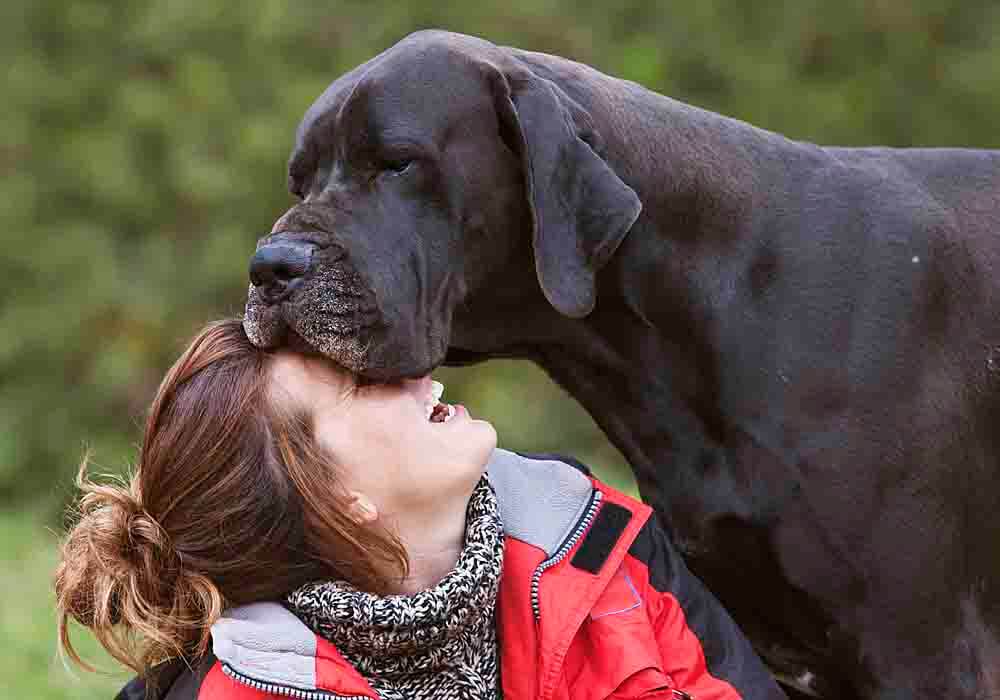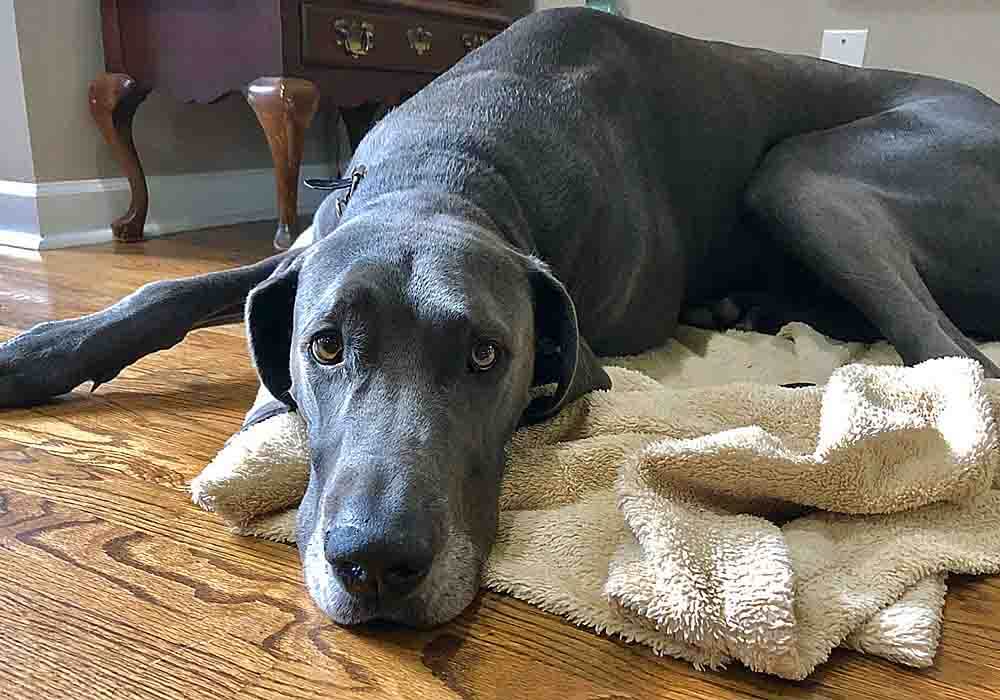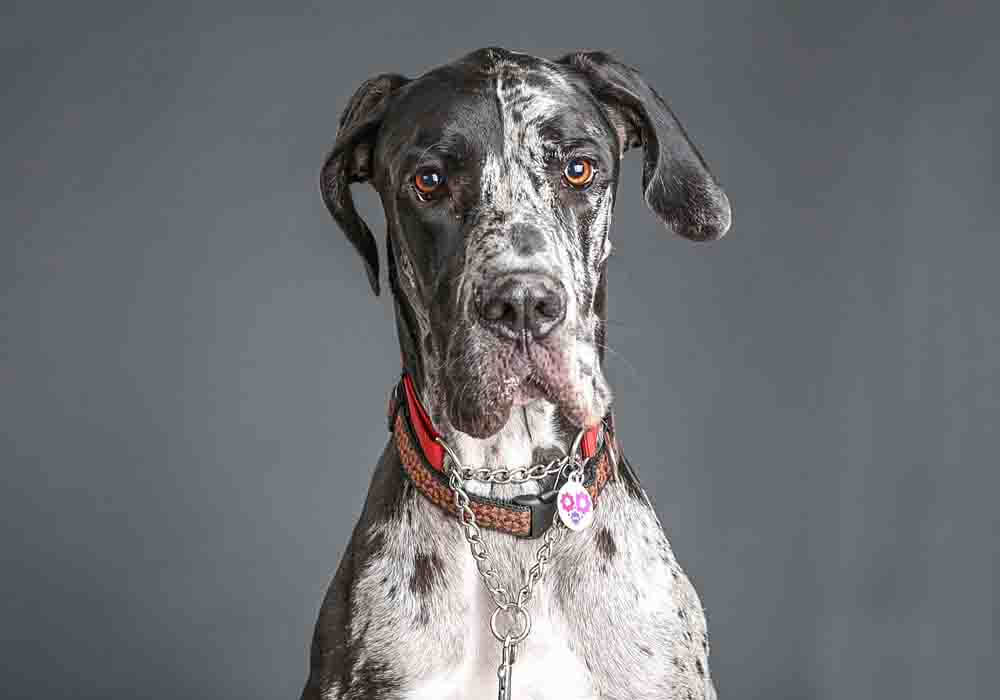Great Dane Good And Bad
13 Pros And Cons Of This Amazing Breed
by Ken Alden
Irrespective of their popularity and killer looks, Great Danes are still a mystery to most dog lovers who have a hard time understanding the dog's exact nature and temperament. This article looks to cut thru the mystery surrounding this breed.
Great Dane Good And Bad...
Good
- Very affectionate
- Family friendly
- Make excellent watchdogs
Bad
- Tend to chew and destroy things
- They drool a lot
- Very costly to maintain
In this article, we will discuss the pros and con parts of owning a Great Dane by answering the most commonly asked questions by new and current owners. We will also discuss the dog's positive and negative temperament qualities. Let’s get started!...
Pro-tip: Ever try lifting a Great Dane? Their weight can hurt not only your back but their joints when they hop down from cars, sofas or even your bed. To protect your back and theirs check out the best Mastiff ramps on Amazon.com now.

Are Great Danes Affectionate?
Great Danes are commonly referred to as “gentle giants” due to their highly affectionate and friendly disposition, regardless of their daunting size. These dogs may look intimidating on the outside, but love to cuddle with their owners. They are also extremely playful and don’t really have unpredictable natures as some breeds do.
In fact, 80% of Great Danes that underwent the American Temperament Test have passed, which is a very good number! This test doesn’t measure the aggression or territorial nature of the breed but rather measures how well a breed is able to interact with various humans in different situations and environments.
In short, Great Danes are definitely found at the top of the
list in terms of affection and playfulness which is a definite good side of a Great Dane good and bad!
Are Great Danes Chewers?
True to their size, Great Danes have strong jaws and teeth that love to gnaw and chew. Like most dog breeds, Great Danes love to have something they can chew on whenever they feel like it. The only problem is that due to their jaws' strength and size, they may end up chewing on more things than most dogs.
This is not only a huge drawback in terms of damage to property, but it also can end up being dangerous to the dogs if they decide to chew on something that might potentially injure them, like poisonous substances and live wires. Remember that if their habit of chewing on anything and everything is not nipped in the bud, they may never be trained out of it.
Hence, you must make sure you train them not to chew right from the puppy stage. Also, buy them as many chew toys as you can afford, as this helps to keep them occupied. Additionally, dog bones and other food items that are chewable are also great alternatives.
Are Great Danes Destructive?
When it comes to Great Dane good and bad we have to discuss whether they're destructive due to their size. Great Danes are large dogs who have higher energy levels when compared to most other breeds. Hence, they can be quite destructive if their energy is not put to use in constructive ways. This is one of the reasons why these dogs will not be a great option for owners who don’t have the time or space to exercise and play with them.
Additionally, some owners claim that Great Danes tend to get destructive when left alone in a house with no company. So if you live in an extremely small apartment with no outdoor space and don’t have the time to exercise a Great Dane daily, this may not be the best breed for you.
However, do remember that not all Great Danes are exactly alike
(even if they have similar tendencies) as most of the habits and traits are
formed by the environment they’re brought up in. So, if you’re going to buy a
Great Dane puppy, then you do have the chance to train it well, which will
eliminate most of its aggressive or destructive tendencies.
Are Great Danes Droolers?
This may not be very surprising, but Great Danes are huge droolers. This is mainly due to their face and jaws' structural composition, which is quite square with loose lips. Due to this, they aren’t very good at containing their saliva within their mouths and end up drooling all over you and your home.
While there always will be a certain amount of drool about them, the highest amount of drooling occurs when they're eating, drinking, or exercising, so you may want to keep a few old rags in hand to tackle this problem.
There is no exact amount of drool you can expect from a Great Dane as that largely depends on the individual facial structure (which slightly varies from dog to dog) and the amount of natural saliva production in the dog. Some Great Danes can drool more than others, and there’s really no preventive method you can employ for this problem.
However, you may also want to keep an eye out
for excessive drooling (way more than what is generally expected in a Great
Dane), as it could be the indication of a medical condition known as ptyalism, which is an excessive flow of saliva in animals. If this is
the case, you can take your dog to the vet and get him an antiseptic solution,
which will help reduce the amount of saliva that’s produced.
So sad to say, drooling is a bad part when it comes to Great Dane good and bad.
Are Great Danes Easy or Difficult to Train?
Make no mistake, Great Danes are no pushovers and can be very difficult to train after they have crossed a certain stage. However, if they’ve been disciplined and trained to obey their owners from a very young age, they definitely can be brought up with little to no difficulty.
It only becomes hard when you attempt to train full-grown Great Danes who are already set in their temperament ways. This doesn’t mean that it won’t be possible, but it is going to be relatively hard.
When training Great Danes, who are puppies or young adults, it is best to use the reward-based training system, as almost all dog breeds react positively to this method. This implies that you either reward your dog with a doggie treat or with a physical and verbal appreciation for every command that is obeyed. This helps dogs understand what is expected of them while also making the ‘training process’ fun and enjoyable.
Additionally, you need to realize that not all Great Danes are
exactly the same in terms of their personality. While some may be easier to
train, others might show certain traits of resistance and stubbornness. When
this occurs, you need to be a little firmer and not give in to the dog easily,
as that will result in an untrained and unmanageable dog in the future. Great Dane good and bad
Pro-tip: Great Dane anxiety, aggression, destructive chewing, jumping up, fearfulness, and other behaviors can be controlled with the right training program.
Here’s a great course that
addresses these issues along with many other dog training basics: Check it out now!
Are Great Danes Family Friendly?
As mentioned earlier, Great Danes make great companions and family dogs due to their highly affectionate and playful nature. Additionally, they get along extremely well with children, especially if they’ve been exposed to their company right from the puppy stage.
Great Danes can be territorial every once in a while, but if they’re used to having kids and other pets around, they will adapt themselves accordingly. However, if the Great Dane is a full-grown adult and has never been around many people at once, let alone kids and other pets, you may want to give it some time to get accustomed to the new company. great dane good and bad
Once again, it all depends on the nature and temperament that
the dog has ingrained right from the time of birth, as some Great Danes can be
extremely territorial and ferocious if they’ve not been trained to be
family-friendly. So, it’s best to train them to be obedient while exposing them
to different people and their company right from an early stage.
Are Great Danes High or Low Maintenance?
When it comes to the general maintenance of a Great Dane, it can be divided into three main categories:
- Grooming
- Dental care
- Exercise
Each of these requires separate attention, time, and products. Let’s look at what this exactly entails below.
Grooming
Fortunately, unlike many other dog breeds, Great Danes don’t have to undergo regular grooming appointments (cutting and brushing fur) as they don’t have a thick coat of fur. Instead, they possess a shiny, sleek coat that will have to be maintained with routine baths and occasional brush outs.
Although their coats won’t get mangled and dirty very often, they still do need to be bathed whenever required, as this will help maintain the healthy fur coat. Just be sure not to bathe them too often as that can dry out their skin, leading to other skin problems. Occasionally running a brush through their coats will greatly minimize the fur from shedding.
Apart from giving them regular baths, you will also need to
clean their ears, as this is one part most owners fail to clean. Dogs can
develop infections in their ears if they
aren’t cleaned well. Hence, make sure you clean their ears at least once in a
month, as cleaning it too often may damage their ear canal. Additionally,
invest in proper dog ear cleaners as these will be mild and soft and won’t have
any adverse effects.

Learn more about what it takes to groom a Mastiff and some great instructions on how to do so on our Mastiff Grooming page.
Dental Care
Though it is often neglected, researchers have proved that oral hygiene is extremely important for all dogs, and not maintaining their teeth can lead to premature dental problems. It is best to brush your Great Dane’s teeth at least thrice a week to avoid this, if not every day. This process can be a little daunting in the beginning, so it’s best to go through a professional guide, especially if you’re dealing with an adult Great Dane.
Additionally, there is a vast range of dental care products
specifically designed to make the job easier, so you can invest in those to
make the process easier on both you and the Great Dane, especially if you find
the dog to be unobliging or resistant in the beginning.
Exercise Requirements
Great Danes require regular exercise on an everyday basis, depending on their age. When they are in the puppy or senior dog stage, this requirement will have to be modified to suit their energy levels and health concerns, but during their young and mature adult stages, a Great Dane will definitely require at least an hour’s worth of physical activity and exercise.
Without this, a Great Dane (like most other breeds) can feel locked up and develop negative behavioral characteristics.
Exercise can be done in the form of walking and playing other games like fetch. Additionally, if you happen to have a considerably large backyard, then you can let them loose there for a while to expend their energy through their own means. However, taking them on a walk and playing with them can strengthen the bond between the owner and the dog.
So are Danes high or low maintenance? We've written a helpful article on this very topic which you can check out here.
Are Great Danes Messy?
Great Danes are mostly called messy because they’re bigger than most dogs and can be a little clumsy, especially if they live in very close quarters. Additionally, they don’t shed as much as dogs with long fur, but they do occasionally shed, especially if their fur hasn’t been brushed in some time.
They also tend to be messy eaters and drinkers (due to their large jaws), so you may want to keep a few rags in hand when it’s mealtime. Also, as mentioned earlier, they can be heavy droolers, which can definitely contribute to their “messiness.”
Pro-tip: Great Dane's (and their owners) love dog crates…and for good reasons. Crates keep dogs from mischief while you're away, are perfect for house training, for traveling by car, and provide the dog a place to de-stress. Check out the best Mastiff crates on Amazon.com now.
Are Great Danes Protective and Good Watchdogs?
Great Danes are definitely an apt breed for protecting and guarding your home and family. These dogs have their gentle and affectionate qualities, but can be aggressive when the need arises. Additionally, Great Danes are highly commended for their barks' loudness, which is enough to intimidate and deter any intruder. Hence, you can be sure that even the gentlest Great Dane will make a good watchdog.
Are Great Danes Prone to Separation Anxiety?
Yes, Great Danes are dogs who love being social and have their family around them. When left alone, especially for long periods, this can cause major anxiety in some Great Danes, which can even result in destructive behavior.
As mentioned earlier in this article, Great Danes are big dogs
and can be destructive if they wish to be, and separation anxiety is one major
reason for this problem. Hence, it is advisable to never leave your Great Dane
alone for long periods.
What Are Great Dane Health Issues?
Great Danes can suffer from genetic diseases, so it is best not to miss out on regular visits to the vet while also keeping an eye out for the common diseases Great Danes usually suffer from.
Bloating is one of the fatal conditions Great Danes may struggle with, so it is wise to know what the early symptoms are for this disease in order to get them help before it is too late. Joint and bone diseases such as hip dysplasia and osteoarthritis are also common among Great Danes due to their large frames.
Additionally, Great Danes are also prone to suffer from thyroid
problems and heart diseases
such as dilated
cardiomyopathy and tricuspid
valve dysplasia.
Are Great Danes Expensive to Keep?
As with all dogs, Great Danes come with their own set of needs and requirements, which you will need to have a monthly budget for. This may be quite an expense, depending on your situation and circumstances.
Here are some of the things you may have to pay for after you’ve made the initial investment of buying a Great Dane.
- Dog Food: It goes without saying that this is an unavoidable expense and they do eat a lot! You will also want to invest in dog treats. Great Dane good and bad
- Vaccinations and medications: Regular visits to the vet are a necessity you can’t ignore as well. The same goes for vaccines and medicines when your dog falls ill.
- Toys and accessories: Great Danes love to chew, so you’ll have to invest in chew toys to make sure they don’t chew on something they aren’t supposed to! Additionally, dog leashes, beds, and kennels may be an added expense when you first get a dog.
- Daycare: If you’re going to be working a 9 to 5 job and there’s not going to be anyone else to look after your Great Dane at home, you may have to consider leaving him at a dog daycare. Considering they're prone to separation anxiety this might be more of a necessity than you think.
- Dog walker: If you’re too busy, it may be a good idea to hire a dog walker who will be able to take the dog on regular walks and give it the exercise it requires on a daily basis. Great Dane good and bad
Are Great Danes Fence Jumpers?
Whether
or not a Great Dane can jump over your fence depends on the height of your
fence. However, due to their long legs and strong limbs, Great Danes can most
definitely jump over fences that are as high as 5 feet (1.5 meters).
Great Dane Good And Bad...Final Thoughts
This article talks about both the good and bad perks of owning a Great Dane. While most of its attributes lean towards the positive side, Great Danes may not be the right choice for you if you do not have the time, space, or means to occupy and care for a big dog. We hope you found this article enlightening as you figure out if this breed is the one for you!
Return to the top of this Great Dane Good And Bad page

About the Author...
Ken Alden, a dedicated Mastiff owner for over eight years, is acclaimed for his expertise in care, grooming, and training. Read more About Me and my dog Shadow.
- Mastiff Guide Home ›
- Great Danes ›
- Great Dane Good And Bad







